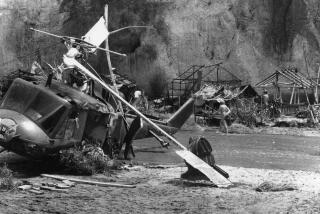Failure to Ask Night Permit for ‘Twilight’ Filming Cited
- Share via
A high-ranking state official testified Tuesday that the defendants in the “Twilight Zone” involuntary manslaughter trial could have sought special permission for two children to work at night on the film’s set, but did not do so.
However, the official, Deputy Labor Commissioner Colleen Logan, was barred by the judge from telling the jury that if she had been asked, she would have prevented the children from taking part in an ultimately fatal 1982 filming scene because they were situated near special effects explosives and a low-flying helicopter.
Earlier in the day, Mark Chen testified that he was never told by director John Landis or associate producer George Folsey Jr. that a helicopter and explosives would be used near his daughter, Renee, 6.
‘Very Fine Experience’
Chen said he and his wife agreed to allow their only child to be in the film because “we felt it would be a very fine experience for her. And also when she grew up she would have a lot of memories of what she had done.”
Chen, a Pasadena-area resident, broke into uncontrollable sobbing during his brief testimony.
Renee and Myca Dinh Le, 7, died along with actor Vic Morrow, 53, when struck by the helicopter, which spun out-of-control during the night filming of a Vietnam battle sequence. A key issue in the case is whether director Landis and his associates failed to seek state permits for the children because they knew the filming was dangerous.
The prosecution contends that the defendants knew they could apply for special permission but did not do so because the scene was inherently dangerous. The defense agrees that the film makers hired the children illegally--a misdemeanor for which they were not charged--but did so only because state regulations specifically state that children 8 and younger cannot work after 6:30 p.m.
“It’s indefensible if they were charged with working the children without a permit,” defense counsel Harland Braun said. “But it’s defensible if you are charged with manslaughter.”
Key Witness on Stand
Called a key witness by both sides, Logan finally took the stand Tuesday after testifying twice during the last week without the jury present in order to allow Los Angeles Superior Court Judge Roger Boren to establish guidelines on the scope of her testimony.
In the past, Logan, the top state authority for issuing children work permits for theatrical productions, has outspokenly criticized the defendants for having employed the children in the fatal scene.
Boren, however, agreed with the defense that since Logan was not present at the filming, she could not testify concerning safety on the set. Boren also barred the state official from citing examples of other filming requests she has rejected.
In her 1 1/2 hours of testimony, Logan explained that permits were normally granted for children to work on film sets during the day, with a teacher-welfare worker present to care for their education, welfare and safety. The teacher-welfare workers, she added, had the authority to prevent children from working in dangerous scenes.
Her Decision
Logan said she was personally responsible for deciding whether to grant special permission for scenes in which young children would work at night or in which safety was questioned.
In reaching her decisions, Logan said, she considered such safety factors as whether special effects and explosives were used near the children. She was barred by Boren, however, from explaining the weight she placed on such factors.
During cross-examination, the defense sought to attack Logan’s credibility by pointing out that the state’s guidelines, which Logan helped prepare, specifically said that children under the age of 8 could not work after 6:30 p.m.
Logan acknowledged that the guidelines were written that way to discourage producers from seeking special permission for young children to work at night. She added, though, that film producers nonetheless knew that special permission was available on a limited basis. She receives such requests, she added, “quite often.”
Outside the court, both sides said their cases were strengthened by Logan’s testimony. Defense counsel Harland Braun said the defendants should not be held accountable for failing to follow what amounted to “a secret law.”
Deputy Dist. Atty. Lea Purwin D’Agostino, meanwhile, contended that Logan’s testimony showed “everyone in the film industry was aware children could work at night.”
Today, the jury will view film of the fatal crash at the Academy of Motion Picture Arts & Sciences.
More to Read
Only good movies
Get the Indie Focus newsletter, Mark Olsen's weekly guide to the world of cinema.
You may occasionally receive promotional content from the Los Angeles Times.









